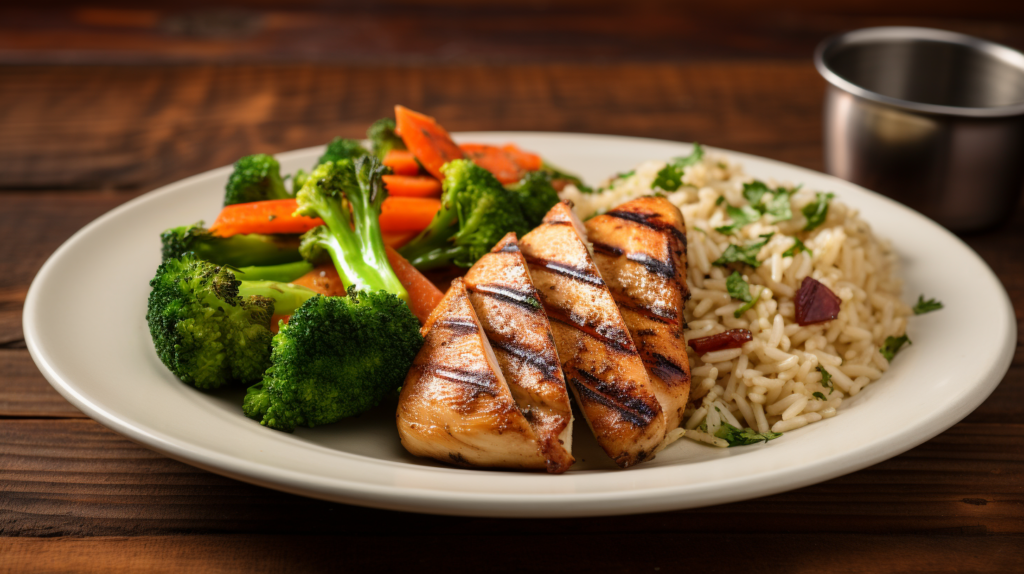
Are you struggling with How to Lose 3 Pounds Per Week at a steady pace? You’re not alone – many people grapple with the challenge of dropping 3 pounds per week. This blog post will guide you through expert-approved strategies and potential pitfalls when aiming for this specific weight loss goal.
Ready to take your first step towards effective, healthy weight loss? Let’s dive in!
Is Losing 3 Pounds a Week Healthy?
Experts disagree on whether losing 3 pounds a week is healthy, but it’s important to maintain a balanced and sustainable approach to weight loss.
Expert opinions on healthy weight loss rates: How to Lose 3 Pounds Per Week
Several renowned health experts suggest a safe and healthy weight loss to be between one to two pounds per week. They underline the importance of steady, gradual weight loss over rapid, drastic shedding.
Drastic weight losses can lead not only to short-term health problems like nutrient deficiencies but also long-term issues like muscle mass reduction or gallstones. Furthermore, such rates of weight loss are often unrealistic and unsustainable which may result in regaining the lost weight or even more once normal eating habits resume.
Experts, therefore, put stress on creating a balanced diet plan that gradually decreases calorie intake while boosting physical activity levels for sustained and healthy weight management.
They advise against severe restriction diets causing swift losses as they can trigger unhealthy relationships with food leading potentially to disorders like anorexia or bulimia.

The importance of maintaining a balanced and sustainable approach
A balanced and sustainable approach is integral to healthy weight loss. Aiming for quick, drastic changes often lead to disappointment and can harm the body. Instead, consider incorporating moderate exercise and healthier food choices into your daily routine consistently over time.
Successful long-term weight loss doesn’t happen overnight; it involves gradual lifestyle modifications that contribute positively to overall health. Striking a balance helps avoid deprivation or exhaustion from extreme diets or workouts, enhancing mental wellbeing along with physical fitness.
Sustainability ensures these new habits last beyond the short term, fostering true transformation in your weight loss journey.
Recommended Strategies for Losing 3 Pounds a Week
To achieve a weight loss of 3 pounds per week, it is important to focus on burning more calories than you consume, staying active with exercise, incorporating zero-calorie foods in your diet, avoiding added sugars, and trying intermittent fasting.
Burning more calories than you consume
To lose weight, it’s crucial to create a calorie deficit by burning more calories than you take in. Here are some effective strategies:
- Boost your physical activity: Engage in regular workouts that combine both cardio and strength training exercises.
- Adopt a balanced diet: Include foods rich in fiber, protein, and healthy fats to feel full longer and curb overeating.
- Monitor your food intake: Regularly tracking what you eat can help identify areas for improvement.
- Prioritize sleep: Lack of sleep can interfere with your body’s ability to burn calories efficiently.
- Drink ample water: Staying hydrated can support metabolism and help control hunger pangs.
- Manage stress effectively: High stress levels can lead to emotional eating and disrupt calorie-burning processes.
- Practice mindful eating: Pay attention to your food and eat slowly to enjoy meals while keeping calorie intake in check.
Staying active and incorporating exercise
Regular physical activity is key to achieving a weight loss goal of 3 pounds per week. Here are some strategies to help you stay active and incorporate exercise into your routine:
- Engage in cardio workouts like running, cycling, or swimming to burn calories and increase heart rate.
- Try high – intensity interval training (HIIT), which involves short bursts of intense exercise followed by periods of rest.
- Incorporate strength training exercises like weightlifting or bodyweight exercises to build muscle and boost metabolism.
- Make it a habit to take brisk walks during breaks or after meals to get moving throughout the day.
- Find activities that you enjoy, such as dancing, hiking, or playing a sport, to make exercise more enjoyable and sustainable.
- Set realistic goals and gradually increase the intensity and duration of your workouts over time.
- Stay consistent with your exercise routine by scheduling dedicated time for physical activity each day.
- Consider working with a personal trainer or joining group fitness classes for added guidance and motivation.

Including more zero-calorie foods in your diet
- Add plenty of fruits and vegetables to your meals
- Snack on crunchy, low – calorie options like celery or cucumber
- Incorporate leafy greens into salads or smoothies
- Enjoy hydrating foods like watermelon or cucumbers
- Include fiber – rich foods such as broccoli or berries
- Opt for lean protein sources like skinless chicken breast or tofu
- Swap high-calorie snacks with zero-calorie alternatives like air-popped popcorn or sugar-free gelatin
- Drink calorie – free beverages like water, unsweetened tea, or black coffee
Avoiding added sugars
To support your weight loss journey of losing 3 pounds per week, it’s important to avoid added sugars in your diet. Added sugars can be found in a variety of processed foods and beverages, such as soda, candy, baked goods, and even some seemingly healthy options like flavored yogurt or granola bars.
These added sugars contribute empty calories without providing any nutritional value. Instead of reaching for sugary snacks or drinks, opt for whole foods like fruits and vegetables that are naturally sweetened.
Reading food labels can also help you identify hidden sources of added sugars so you can make healthier choices. By avoiding added sugars, you’ll not only reduce calorie intake but also improve overall health and well-being.
Trying intermittent fasting: How to Lose 3 Pounds Per Week
Intermittent fasting is a popular approach to weight loss that involves cycling between periods of eating and fasting. This method can help you lose weight by reducing your calorie intake, as well as improving insulin sensitivity and increasing fat burning.
Common intermittent fasting methods include the 16/8 method, where you fast for 16 hours and restrict your eating to an 8-hour window, or alternate-day fasting, where you eat normally on some days and severely restrict calories on others.
However, it’s important to note that intermittent fasting may not be suitable for everyone and should be done under the guidance of a healthcare professional.
The Potential Risks of Losing 3 Pounds a Week
Losing 3 pounds a week may lead to muscle loss and nutrient deficiencies, negatively impact your metabolism, and potentially contribute to an unhealthy relationship with food and body image.
The possibility of muscle loss and nutrient deficiencies
Losing weight at a rate of 3 pounds per week may increase the risk of muscle loss and nutrient deficiencies. When you lose weight too quickly, your body may start breaking down muscle tissue for energy instead of using stored fat.
This can lead to a decrease in muscle mass and strength over time. Additionally, rapid weight loss can result in nutrient deficiencies if you’re not consuming enough calories or a variety of nutrients through your diet.
It’s important to ensure that you’re getting an adequate intake of protein, vitamins, and minerals when aiming to lose weight at this rate.
Negative impacts on metabolism
Losing three pounds per week may have negative impacts on metabolism. When we lose weight too quickly, our bodies can go into “starvation mode,” where they try to conserve energy by slowing down our metabolic rate.
This means that our bodies burn fewer calories throughout the day, making it harder to continue losing weight at the same rate. It’s important to strike a balance between achieving your weight loss goals and maintaining a healthy metabolism.
To support your metabolism, focus on eating nutrient-rich foods and allowing yourself enough calories for sustained energy.
Unhealthy relationship with food and body image
An unhealthy relationship with food and body image can develop when weight loss becomes the sole focus, leading to obsession and negative self-perception. This can manifest through restrictive eating patterns, excessive exercise, and constantly comparing oneself to others.
It’s important to address these feelings and seek support from professionals or peer groups that promote a healthy mindset and body positivity. Developing a positive relationship with food and self-image is essential for long-term well-being.

Finding a Healthy Amount of Weight to Lose Per Week
Consulting with a healthcare professional can provide personalized advice on understanding individual weight loss goals and body composition.
Understanding individual weight loss goals and body composition
To embark on a successful weight loss journey, it is crucial to understand your individual weight loss goals and body composition. Everyone’s weight loss goals are unique, as they depend on factors such as current weight, height, age, metabolism, and overall health.
It is important to set realistic and achievable goals that align with your personal needs and preferences. Additionally, understanding your body composition can provide valuable insight into the ratio of lean muscle mass to body fat.
This knowledge can help you tailor your approach to weight loss, ensuring that you focus on maintaining or building muscle while losing excess fat. By taking these factors into account when setting your weight loss goals and considering your body composition, you can develop a personalized plan that maximizes results and sets you up for long-term success.
Consulting with a healthcare professional for personalized advice
Consulting with a healthcare professional is essential for personalized advice when it comes to weight loss. They can assess your individual needs, health conditions, and goals to provide guidance tailored specifically to you.
A healthcare professional will take into account factors such as your current weight, medical history, and any medications you may be taking. They can help create a safe and effective plan that promotes healthy habits while addressing any potential risks or concerns.
Whether it’s determining the appropriate rate of weight loss or providing support throughout your journey, consulting with a healthcare professional ensures that you receive expert guidance for long-term success.
What to Eat to Support 3 Pounds of Weight Loss Per Week

To support a weight loss goal of 3 pounds per week, focus on smaller portion sizes, balanced meals, and staying hydrated.
Making use of smaller portion sizes
Achieve 3 pounds of weight loss per week by making use of smaller portion sizes.
- Serve your meals on smaller plates to visually trick yourself into feeling satisfied with less food.
- Use measuring cups or a kitchen scale to ensure you’re consuming appropriate portions.
- Be mindful of portion sizes when dining out; consider sharing a meal or asking for a to – go container right away.
- Focus on nutrient – dense foods that fill you up without adding excessive calories.
- Chew thoroughly and eat slowly to give your brain time to register feelings of fullness.
Avoiding food restrictions and focusing on balance
To achieve a healthy and sustainable weight loss of 3 pounds per week, it’s important to avoid strict food restrictions and instead focus on finding balance in your diet. This means including a variety of nutritious foods that provide essential nutrients while still allowing for some flexibility and enjoyment.
Rather than cutting out entire food groups or depriving yourself, aim to create a well-rounded meal plan that includes fruits, vegetables, lean proteins, whole grains, and healthy fats.
By nourishing your body with a balanced diet, you can support your weight loss goals without sacrificing overall health and well-being.
Creating a meal plan and prioritizing hydration
Creating a meal plan and prioritizing hydration is essential for achieving 3 pounds of weight loss per week. Here are some tips to help you get started:
- Plan your meals in advance, including breakfast, lunch, dinner, and snacks.
- Focus on incorporating a variety of nutrient – dense foods such as fruits, vegetables, lean proteins, and whole grains.
- Control portion sizes by using smaller plates or measuring utensils.
- Aim to drink at least 8 cups of water per day to stay hydrated and support your weight loss efforts.
- Limit sugary beverages and opt for water or unsweetened drinks instead.
- Consider tracking your food intake using a mobile app or journal to monitor your progress.
The Role of Physical Activity in Achieving 3 Pounds of Weight Loss Per Week

Incorporate regular exercise and find activities you enjoy to increase calorie burn. Explore different cardio workouts to achieve your weight loss goals. Start incorporating physical activity into your routine for maximum results.
Read more about the benefits of exercise in achieving 3 pounds of weight loss per week!
Incorporating regular exercise and finding activities you enjoy
Regular exercise is essential for achieving your weight loss goals. Here are some tips to help you incorporate exercise into your routine:
- Start by finding activities that you enjoy. Whether it’s jogging, dancing, swimming, or playing a sport, choose something that makes you happy and motivated to keep moving.
- Make it a habit to exercise regularly. Schedule specific times in your week dedicated to physical activity and stick to them.
- Mix up your workouts to keep things interesting. Try different types of exercises such as cardio, strength training, and flexibility exercises.
- Set realistic goals and track your progress. Gradually increase the intensity and duration of your workouts over time.
- Find an exercise buddy or join a class to stay motivated and hold yourself accountable.
Exploring different cardio workouts to increase calorie burn
To increase calorie burn and support your weight loss journey, consider incorporating different cardio workouts into your fitness routine. Here are some options to explore:
- Running or jogging: Lace up your sneakers and hit the pavement for a high-intensity workout that helps burn calories and build endurance.
- Cycling: Whether you prefer indoor cycling classes or outdoor bike rides, cycling is a great way to get your heart rate up and torch calories.
- Swimming: Take a dip in the pool for a low-impact cardiovascular workout that engages multiple muscle groups while minimizing stress on joints.
- HIIT (High-Intensity Interval Training): Alternate between short bursts of intense exercise and brief recovery periods to maximize calorie burn during shorter workout sessions.
- Jumping rope: This simple yet effective exercise can be done anywhere and provides a full-body cardio workout while improving coordination and agility.
- Dancing: Join a dance class or simply put on some music at home – dancing is a fun way to get moving while burning calories.
- Stair climbing: Skip the elevator and take the stairs whenever possible. Climbing stairs engages large muscle groups, elevates heart rate, and burns calories.
- Kickboxing or martial arts: These high-energy workouts combine cardio exercises with strength training movements, providing an intense calorie-burning session.
The importance of rest and recovery for overall health
Rest and recovery play a crucial role in our overall health. When we give our bodies time to rest, it allows them to repair and regenerate. Additionally, adequate rest helps to reduce the risk of injury and supports optimal mental well-being.
Resting also allows our muscles to recover after intense physical activity, leading to better performance and muscle growth. So make sure you prioritize getting enough sleep each night and incorporate regular rest days into your exercise routine for a healthier body and mind.
The Benefits of Intermittent Fasting for Weight Loss
Intermittent fasting can help with weight loss by promoting a calorie deficit and improving insulin sensitivity.
Different fasting methods and their potential benefits
Intermittent fasting is a popular approach to weight loss because it can help you shed pounds quickly. Here are some different fasting methods and the potential benefits they offer:
- Time-restricted fasting: This involves limiting your eating window to a certain number of hours each day, such as 8 or 10 hours. It can help regulate blood sugar levels and promote fat burning.
- Alternate-day fasting: With this method, you eat normally on some days and restrict calories on others. It may lead to significant weight loss and improvements in insulin sensitivity.
- 5:2 fasting: This involves eating normally for five days of the week and drastically reducing calorie intake (to around 500-600 calories) on two non-consecutive days. It can result in weight loss while still allowing for regular eating most of the time.
- Extended fasting: This refers to longer periods of fasting, typically lasting 24 hours or more. Some people choose to do extended fasts for several days or even weeks. It may promote autophagy (the body’s process of self-cleaning) and metabolic flexibility.
Understanding the potential side effects and considerations
Losing weight at a rate of 3 pounds per week may have potential side effects and considerations to keep in mind. Rapid weight loss can lead to muscle loss and nutrient deficiencies, so it’s essential to ensure you’re getting enough protein and vital vitamins and minerals.
It’s also important to be aware that losing weight too quickly can negatively impact your metabolism, making it harder to maintain or continue losing weight in the long run. Additionally, it’s crucial to acknowledge the potential for developing an unhealthy relationship with food and body image when focusing solely on rapid weight loss goals.
Take these factors into consideration before embarking on a fast-paced weight loss journey.
Determining if intermittent fasting is the right approach for you
Intermittent fasting has gained popularity as a weight loss strategy, but it’s important to determine if it’s the right approach for you. Consider your lifestyle and eating habits.
Are you able to restrict your eating window? Are you comfortable with periods of hunger? Additionally, consult with a healthcare professional who can evaluate any potential health concerns or conditions that may affect your ability to fast safely.
Ultimately, determining if intermittent fasting is the right approach for you requires careful consideration of your individual needs and circumstances.
Maintaining Long-Term Weight Loss and Overall Wellness
Focus on sustainable habits and lifestyle changes to ensure long-term weight loss success and overall well-being. Seek support, whether from professionals or support groups, to stay accountable and motivated along your journey.
Emphasizing sustainable habits and lifestyle changes
Developing sustainable habits and making lifestyle changes are key factors in achieving long-term weight loss and overall wellness. Instead of relying on quick fixes or fad diets, it’s important to focus on creating healthy habits that can be maintained over time.
This includes incorporating regular physical activity into your routine, choosing nutrient-dense foods, managing portion sizes, prioritizing hydration, and finding strategies to cope with stress or emotional eating.
By making sustainable changes to your lifestyle, you can not only achieve your weight loss goals but also improve your overall health and well-being for the long term.
Focusing on overall health and well-being, not just weight loss
Prioritizing overall health and well-being is essential when it comes to weight loss. It’s not just about shedding pounds; it’s about adopting a balanced and sustainable approach that benefits your body in the long run.
By focusing on nourishing your body with nutrient-dense foods, staying active, getting enough sleep, and managing stress levels, you can achieve holistic wellness while working towards your weight loss goals.
Remember, true success lies in finding a healthy lifestyle that supports both your physical and mental well-being.

Seeking support and accountability from professionals or support groups
Support and accountability are crucial when it comes to achieving and maintaining weight loss goals. By seeking the guidance of professionals, such as registered dietitians or personal trainers, you can receive personalized advice and expertise tailored to your specific needs.
These professionals can provide valuable insights on nutrition, exercise routines, and help create a realistic plan for sustainable weight loss. Additionally, support groups offer a sense of community where you can connect with others who share similar challenges and goals.
This type of support system can provide encouragement, motivation, and tips for staying on track throughout your weight loss journey. With the right support in place, you’ll have the tools necessary to overcome obstacles and stay committed to your goals.
Conclusion: How to Lose 3 Pounds Per Week
Achieving a weight loss of 3 pounds per week is possible with the right strategies and approach. By focusing on creating a calorie deficit through balanced eating, regular exercise, and healthy habits, you can reach your goals.
Remember to prioritize sustainability and consult with a healthcare professional for personalized advice along your weight loss journey.
FAQs
1. What are some weight loss tips for losing 3 pounds in a week?
Some tips to lose weight fast include consuming a balanced diet, drinking plenty of water, getting regular exercise and maintaining your motivation throughout your weight loss transformation.
2. Is it safe to lose 3 pounds per week?
Yes, but always consult with your healthcare provider before beginning any fast weight loss program to ensure you’re doing it healthfully.
3. How can I stay motivated while trying to lose three pounds per week?
Following a structured plan, celebrating small victories and remembering the reasons behind your weight-loss transformation can help keep up your weight loss motivation.
4. Can I follow any type of diet for fast-weight-loss in a week?
Not every diet fits all! It’s essential to find an appropriate dietary regimen that suits you best based on nutrition and lifestyle habits when aiming for rapid weekly losses like three pounds.




Leave a Reply